#i love layers. i love references. i love authors trusting their audience is smart.
Explore tagged Tumblr posts
Text
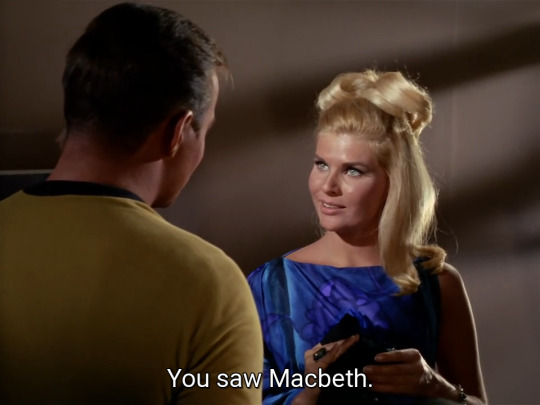
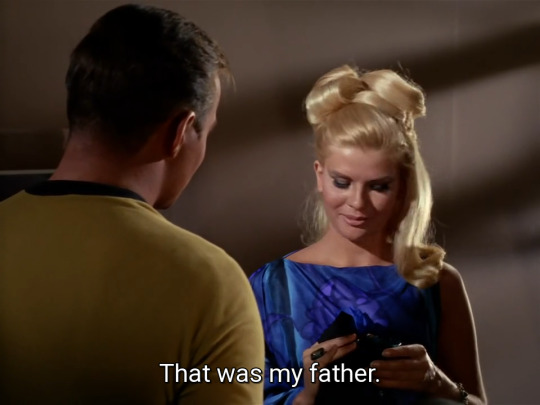
I love how Kirk and Lenore's first meeting goes. He is returning back to the planet with the full intent of speaking to Anton Karidian after looking into Kodos/Karidian through the ship's computer, so his plans are altered when Lenore tells him her father doesn't meet anyone personally or go to parties. He decides to charm Lenore instead. And right away, the dialogue gives a tell: "You saw Macbeth. That was my father."
Macbeth here can refer both to the play itself and the titular character in the play, the Scottish general who is told by a trio of witches he will be king, and he is so consumed by the ambition this prophecy brings, that he murders King Duncan to ascend to the throne. He and Lady Macbeth kill more people to keep their crimes secret and retain power, and the two descend into madness amidst a civil war. Does any of this seem at all familiar, perhaps, to Tarsus IV's revolution, Kodos' declaration of martial law to gain control, etc.? ("The revolution was a success [...] I was a soilder in a cause.")
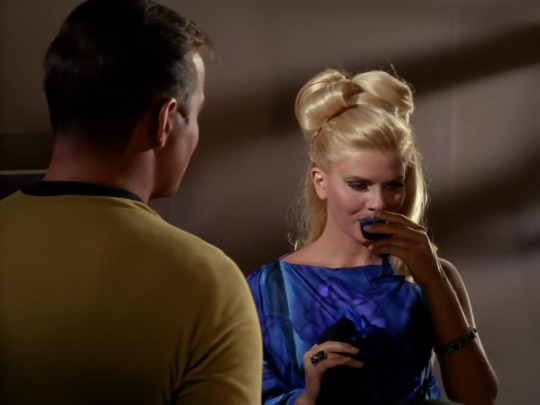
And Lenore goes for a sip of her drink to stop talking. She wants this line of conversation to go nowhere, both because of her father and possibly because she is aware she has said too much. By linking her father to Macbeth, she inadvertently recalls Kodos and Tarsus IV. Remember, she knows that Kirk is a survivor of Tarsus IV, so it is in her interest to play coy and keep Anton Karidian out of the conversation. (In other words, this whole scene is a game of cat and mouse. Kirk wants to use her to get to her father, Lenore wants to kill Kirk to protect her father.)
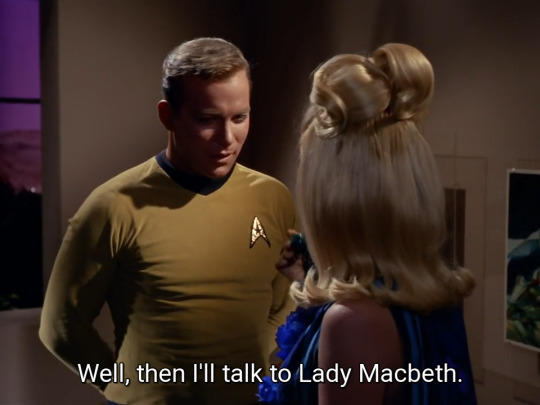
But Kirk is the one to link her to Lady Macbeth, and rather than respond, "My name is Lenore when I am not on the stage," Lenore plays along. By coyly hiding behind the role of Lady Macbeth, she inadvertantly allows Kirk to see how the Karidians work, assuming Kirk knows his Shakespeare. (In all honesty, this dialogue is more so for the audience's benefit. Had Kirk realized it was Lenore right here, I think even Columbo himself would call bullshit. Still, picking out these details makes for a fun rewatch.)
In the play, Lady Macbeth pushes her husband to action and cleans up after his mess by killing Duncan's guards. Lenore was born after the Tarsus IV massacre so this is obviously not to say she pushed her father into a massacre, but she has decided to dispose of the survivors lest they come back to cause problems for her father. It's in this way that Lenore is like Lady Macbeth as the two women commit further crimes to hide the initial crime perpetrated by the one they love and to retain power.
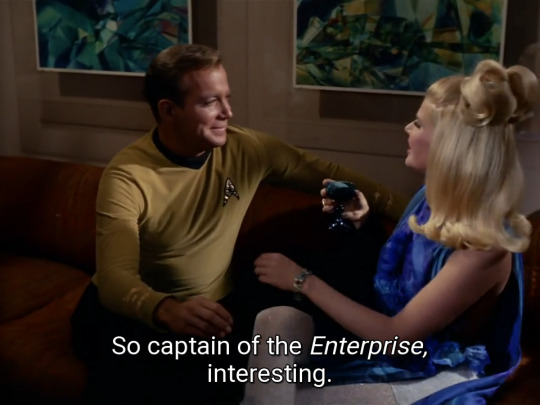

These two are playing unspoken 3D chess, but this is the extent of their conversation. Awkward! Still, it is neat that Kirk ignores Lenore's opening for more information about him. He just takes her phrasing and throws it back at her and then asks a question to actually get her talking.
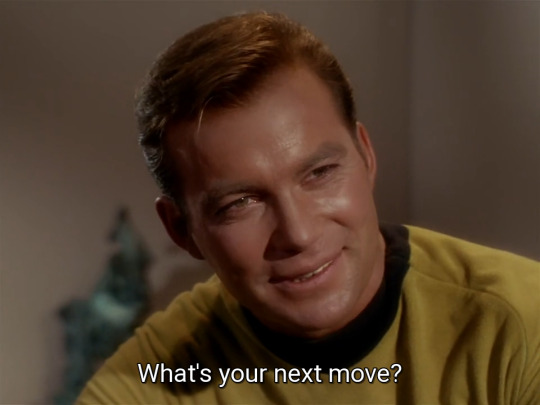
Regardless of Kirk's own knowledge of the play, it is still fun that after saying, "So, Lady Macbeth. Interesting," Kirk then asks, "What's your next move?" This would be akin to asking, "Who do you intend to kill next?" but since the Macbeth references are for the audience's benefit, Kirk's intended meaning is, of course, "Where will you perform next?"
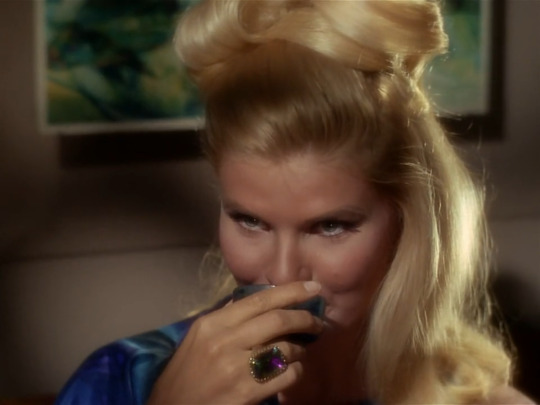
Still, Lenore Karidian just gives him a look as she takes a sip of her drink, as if she understands all too well the layers behind this exchange.
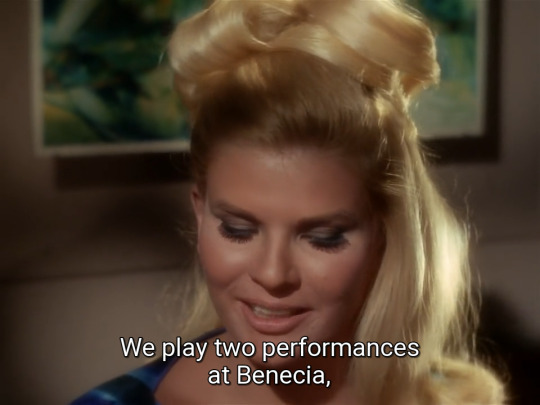
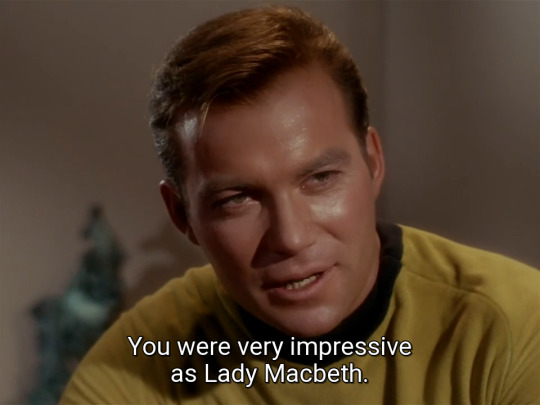
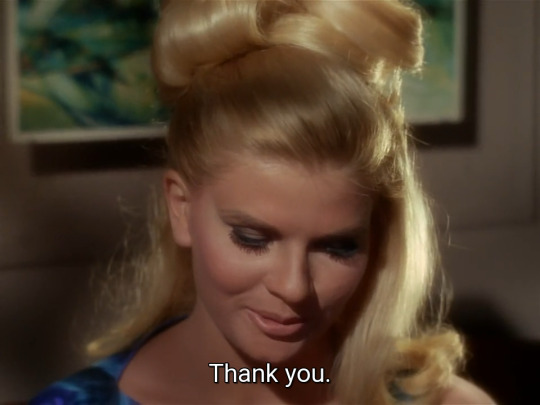
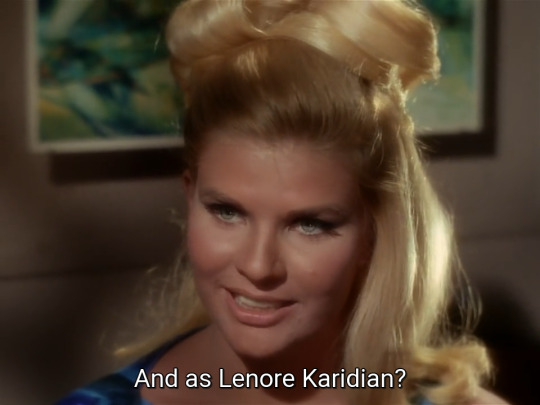
It is by the end of this exchange that Lenore finally tells Kirk her name, and it is by asking how well she played the role of Lenore Karidian. The earlier exchange on the couch might have been odd, but this goes to show Lenore's willingness to play a role, even at the expense of her own life. She's no longer making nods and winks towards the theater. Her life is one long act in a play. Her killing the survivors of Tarsus IV is just as much for her own peace of mind as it is for her father at this point. (Need I remind anyone of the fate of Lady Macbeth?)
#star trek tos#the conscience of the king#jim kirk#lenore karidian#tarsus iv#trek meta#help i am writing more about this episode#but i meant it when i said it in another post: the plot is right there in the shakespeare#i love layers. i love references. i love authors trusting their audience is smart.#and lenore! oh lenore! poor mad lenore! doomed by the narrative and by being the lady of the week
96 notes
·
View notes
Text
Epic Movie (Re)Watch #139 - Brave

Spoilers below
Have I seen it before: Yes
Did I like it then: Yes.
Do I remember it: Yes.
Did I see it in theaters: Yes.
Was it a movie I saw since August 22nd, 2009: Yes, #166.
Format: Blu-ray
1) Like a lot of post Toy Story 3 Pixar movies, Brave gets some crap from people for not being as brilliant as movies like Up. But I really like it!
2) The entire prologue works very well for the film. We get a clear sense of the relationship between Merida and her parents, specifically her mother. It is that relationship with her mother which allows for juxtaposition of their more flawed relationship in the rest of the film. We also get a nice introduction to Mordu and the wisps.

3) Kelly MacDonald as Merida.

There are so few voice over actors who so perfectly represents their characters as perfectly as Macdonald does Merida. I mean it’s mind blowing! The actress is able to capture the princess’s youthful vigor, stubbornness, struggles with her mother, love for her family, and sense of adventure all...perfectly! There is no Macdonald there is only Merida. Merida through and through. Reese Witherspoon was originally cast in the part but dropped out because of her accent problems I think (not 100% sure) and honestly - while I love Reese Witherspoon - I’m so glad she did. I can’t imagine ANYONE else playing Merida quite as spectacularly as Macdonald does.
4) Emma Thompson as Queen Elinor.
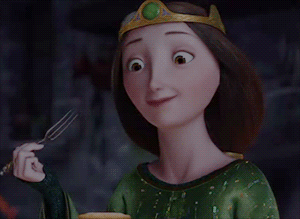
Thompson is a fine voice over actress (not fine as in mediocre but fine as in fine wine). She has had experience before in Treasure Planet and would do voice over work again in this year’s Beauty and the Beast, and she imbues Elinor with the same great sense of character as she does her other parts. You are able to understand that Elinor is trying to come from a place of love and caring for Merida, even if you don’t agree with her actions (which I don’t). It is easy to see where Merida gets her ferocity from as Thompson plays Elinor with the same sense of strength and even gets moments to show off some nice humor. I like Elinor mostly because of the journey she goes on through the film, and i think Thompson does a nice job in the part.
5) “Touch the Sky” by Julie Fowlis is a nice first song to feature in the film. It represents not only the film’s Scottish setting but also Merida’s sense of adventure quite well.
6) Billy Connolly as Fergus.

Connolly is a master comedian and honestly I’m laughing just looking at this GIF of Fergus I’m using. He’s so funny and his voice has such life to it that its a wonderful part to isolate for this movie. But Connolly also has range. Towards the end of the film when he thinks his wife is dead Connolly is able to show some great grief and focus through his portrayal as the Scot. You understand why this man is king in those moments, but you still laugh for most of the film.
7) Was Pixar ever subtle with their references, or was I just too stupid to get them as a kid?

^^^^Lord Macintosh (Steve Jobs helped get Pixar started)^^^^
8)
Elinor [after telling Merida about the forced arranged marriage]: “I don’t know why you’re reacting this way!”

(GIF source unknown [if this is your GIF please let me know].)
9) We get a nice peek into how Fergus & Elinor work as a married couple in small moments throughout the film.
Fergus: “You’re muttering.”
Elinor: “I don’t mutter!”
Fergus: “Ay, you do!”
The way Fergus shows pride in his queen being fierce, the way she is able to quell his rivalry with the other clan heads, his love for her seen after she’s presumed dead, all paint a nice image of a marriage.
10) I may be biased because I first saw this film when I was 16 years old, but I always felt that Merida was listening to her mother’s reasons but they just don’t matter as much as her mother thinks they do. To the contrary, I feel like Elinor really does not listen to or consider what Merida is saying.
11) Obligatory John Ratzenberger cameo in a Pixar film!

Since this is my first recap of a Pixar film, I’ll explain for those who may not know: John Ratzenberger has had a role in literally ever Pixar feature length film ever made. Ham in Toy Story, PT Flea in A Bug’s Life, Mack in Cars, John in WALL-E, the list is all encompassing. They even called notice to this fact in Cars when all the characters are at the drive in movie during the credits.
It’s nice that Pixar has continued their tradition of including the voice actor in all their films, but I’m a bit disappointed his roles seem to becoming progressively smaller. Still, better some John Ratzenberger than no John Ratzenberger.
12) The trio of Macintosh, Macguffin and Dingwall provides a fun extra layer of comedy to the film. Their feuding and bickering are funny in the classic sense. In a lot of ways they are the animated Scottish equivalent to the Three Stooges.

Craig Ferguson as Macintosh, Kevin McKidd as Macguffin, and Robbie Coltrane as Dingwall all do an excellent job with making their characters unique and playing off of the other. They’re really just a lot of fun.
13) This film has some A-grade humor.
Lord Dingwall: “I present, my ONLY son!”


14) I would say the film’s biggest weakness would be is that it can lack focus at times. Especially earl on, some scenes feel like they go on just a little bit too long meaning the film might feel like it doesn’t get very far in it’s 90 minute run time. It’s not fatal and as I said above I still truly enjoy this film, but there’s also a behind the scenes for that I’ll get to later on.
15) With the trio of Merida, Fergus, and Elinor, the film really does do a nice job of fleshing out their relationships in small but important ways. Merida and Elinor’s relationship IS the focus on the film, and I’ve commented on Fergus and Elinor before, but Merida and Fergus are shown to have a nice camaraderie between them. A respect and admiration for each other, as well as a shared sense of humor. This was scene first at the dinner table before Merida was told of the arranged marriage and is seen again (at its best) when Merida and her dad are providing colorful commentary on the suitors as the compete for her hand.

16) Dude...

Merida: “I am Merida, first born descendant of clan Dunbroch. And I’ll be shooting for my OWN hand!”
Okay first:
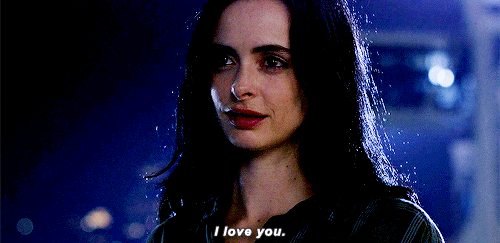
Second: THIS FREAKING SCENE!!!!!

This entire scene has become wildly iconic, and one could say it was so upon release. It is by far the best scene in the entire film, supported by strong character writing, sleek simplicity, and incredible visuals. It is the turning point for the movie. The time when Merida is at her strongest and we as the audience or most enthralled with the plot of the movie. I truly love it.
17) Elinor roughing up Merida and throwing her bow in the fire after the archery contest always made me uncomfortable. It is hard to watch the queen get physically rough with her daughter, even if it isn’t really abusive. I think that’s the point of the moment though: we as the audience (or at least me as an audience member) can really imagine how shook up Merida must feel from this encounter. This is her MOM! Even though they have their differences there’s supposed to be a trust there.
18) The Woodcarver!!!

Voiced by Julie Walters (Molly Weasley herself), The Woodcarver/Witch is a wildly memorable and funny character. She is well established and well used in her brief amount of screen time, providing the film with a sense of visual comedy that feels like it’s straight out of a Bugs Bunny cartoon. I truly appreciate that.
19) Have you heard of Pixar Theory?

Pixar Theory is the in depth theory that all Pixar films take place in one shared continuity/universe, even going into some dark details about how the world of Cars can be the same one that the human filled world of Up or The Incredibles is in. There is one very key and very important idea in Pixar Theory that applies to Brave. Are you guys ready? Okay...
The Witch from Brave is Boo from Monsters Inc.

You can read the full theory here, but the gist of it is that Monsters Inc. does not take place in an alternate dimension but in a future Earth without humans. Therefore, the doors in Monsters Inc. allow the characters to travel in time. Here’s an excerpt from the theory:
And then there’s Boo. What do you think happened to her? She saw everything take place in future earth where “kitty” was able to talk. She became obsessed with finding out what happened to her friend Sully and why animals in her time weren’t quite as smart as the ones she’d seen in the future.
She remembers that “doors” are the key to how she found Sully in the first place and becomes…
A WITCH. Yes, Boo is the witch from Brave. She figures out how to travel in time to find Sully, and goes back to what she believes is the source: The will-of-the-wisps.
A carving of Sully can briefly be seen in the Woodcarver’s/Witch’s hut, lending support to the theory.

Later Merida is also opening doors that lead nowhere, and the author of Pixar Theory argues this is because The Witch found out how to get doors to travel between time. I just thought I’d share this with you. Moving on.
20)
Merida [when she tells the witch what she wants]: “I want a spell to change my mom. That’ll change my fate.”
According to IMDb:
It took six years to make this film. Mark Andrews was initially the consultant, providing the Scottish themes for Brenda Chapman. However, by October 2010, Chapman left after four years of work with Andrews subsequently taking over but still keeping the intended story that Chapman wrote. Originally 80% of the film took place in snow, but when Chapman left the project so did much of the white stuff.
Part of the film’s issue with focus is that it can at times feel like two different films at once: a fantasy epic and a mother/daughter story. I assume these issues are born out of the change in directors (although Brenda Chapman does claim the film is something she’s proud of and that it kept her original vision) and at the end they do mesh well, but they don’t necessarily mesh well throughout the ENTIRE movie.
21) I’m going to be honest: the fact that the big magical twist of the movie is that Elinor is turned into a bear caught me 100% off guard the first time I saw it.

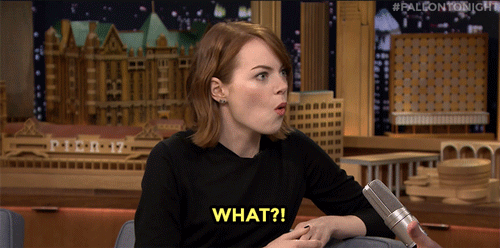
I like it now in hindsight but I was just totally blind sided upon initial viewing. Which was actually kind of nice, because I’d seen 165 films in less than three years before then. I’m not surprised as much as I’d like.
22) The rare time in a film where a character actually says what I’m thinking:
Merida [when Elinor wants to go to the "Let’s Kill a Bear” party downstairs]: “Dad? The Bear King!? If he so much as sees you you’re dead!”
23) This is so applicable to so many talking animal films.
Merida [to Elinor]: “You’re covered in fur! You’re not naked!”
24) So The Witch is sort of a one trick pony. She turned Mordu into a bear, she turned Merida’s mom into a bear, and later she describes her shop as, “Home of bear themed carvings and novelties.” Like, is that like all she can do? Turn people into bears?
25) The scene at the river (underscored by “Into the Open Air”) is a key moment in the relationship between Merida and Elinor. Elinor finally sees that all the things she wanted of her daughter have no use to her now, while all the things “unbefitting” to a princess are what’s keeping them fed in the wilderness. They have some nice fun and it’s just a really great moment.
26) Momma Bear Elinor almost attacking Merida when she’s full bear mode almost kinda makes me jump.

(GIF originally posted by @musicalhog)
27) I wish we got a bit more of the evil bear Mor’du. He shows up in the beginning, he shows up briefly in the middle so Merida and her mom can understand how the spell works, and then he shows up at the end. He’s actually very frightening to look at but not in the film much which is a shame.

28) Merida’s whole speech before the clans about her final decision is a really great moment, I think. It shows how Merida and her mother have grown as they’re finally able to communicate (ironically/poetically when Elinor can’t speak), it shows Merida’s skills as a leader, and it is nice that all three sons agree with Merida about choosing their own destiny. Also Merida is just so happy afterwards!
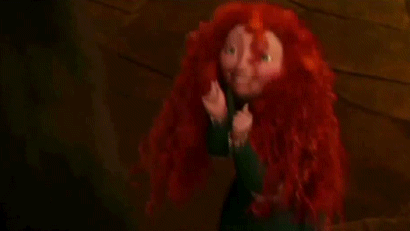
29) Merida thinking her mom is gone breaks my heart.
youtube
Yeah, I’m tearing up now as I watch it. It’s been a rough month for me.
30) The ending of the film is nice. Filled with optimism and energy, in no small part because of the Birdy and Mumford & Sons song “Learn Me Right”. It’s a nice note to finish the film on.
31) Always. Stay. After. The credits.
youtube
Look I don’t get why Brave gets a bad wrap. Sure it’s not as brilliant as Up or Toy Story 3 but so what? It is a fun, entertaining, well made film with some wildly powerful moments and great characters. Merida is incredible, the relationship between her mom is fleshed out very well, and it’s just...I love it. It’s one of my favorite Pixar films, so I definitely recommend it.
#Brave#Merida#Pixar#Kelly Macdonald#Emma Thompson#Epic Movie (Re)Watch#John Ratzenberger#Billy Connolly#Craig Ferguson#Kevin McKidd#Robbie Coltrane#Julie Walters#Pixar Theory#Movie#Film#GIF
8 notes
·
View notes
Text
The Only Thing ‘The Simpsons’ Predicted Is Our Stupidity
If you’re on the internet, you’ve seen the articles. YouTube videos, bargain basement listicles, and social media profiles all ring out with the same refrain: The Simpsons predicted this. Donald Trump’s election, the COVID-19 pandemic, 9/11, murder hornets, and even the explosion in Beirut are all fodder for the shittiest parts of the internet’s favorite content mills.
After 30 years and almost 700 episodes, The Simpsons has become a source of prophecy. It is, of course, all bullshit. When The Simpsons have gotten the future right, it’s only because the show was a razor sharp satire of American life that imagined the worst possible outcome for comedic effect. The Simpsons obviously didn’t have a magical ability to see the future. It’s just that there’s so much of it, people on the internet can splice frames of it together to tell whatever story they want. If it did accidentally predict anything, it’s because our reality is now stupid enough to resemble a cartoon satire of American life.
Like all good satire, The Simpsons held up a mirror. Audiences were scandalized when it premiered in 1989 and they understood that they were part of the joke. But they laughed and kept laughing. Thirty years later, little has changed and many of those early The Simpsons episodes still hit.
Bill Oakley was a writer and a showrunner on The Simpsons during what some fans consider the show’s prime, roughly seasons four through nine. Oakley keeps up with the growing lists of purported predictions and even has them broken down by category.
“Category one, which occurs extremely rarely, is legitimate things we did predict,” he told Motherboard in a Zoom call. “Category two is stuff that just happened in history that people are unaware of because history repeats itself. They aren’t predictions of any sort. Three is just complete bullshit which is usually when somebody pastes two or more old scenes, usually from different shows, together.”
The theory that The Simpsons predicted the Beirut explosion is a typical category three.
“The Beirut one was particularly egregious,” Oakley said. “It was from two different shows and it in no way predicted the Beirut explosion, it just predicted an explosion.”
View this post on Instagram
A post shared by The Realest. (@toolazytowriteausername97) on Aug 5, 2020 at 4:04am PDT
Simpsons as prophecy has come in waves. The first real wave came after 9/11 when fans pointed out supposedly secret messages coded the first episode of season nine, “The City of New York vs. Homer Simpson.” In a quick sight gag, Lisa holds up a magazine with a $9 fare to NYC. The $9 is next to Manhattan skyline and the Twin Towers.
But the articles about Simpsons predictions really took off when America elected Donald Trump the President of the United States. In a 2000 episode “Bart to the Future,” Lisa is President and she references the budget crunch she inherited from President Trump.
According to Oakley, this is the only category one prediction he credits.
“‘Always predict the worst, and you'll be hailed as a prophet,���” Oakley said, quoting his comedy hero musical satirist and math genius Tom Lehrer. “Back then, it played as a joke because people were like, ‘Oh, that’s preposterous.’ As [writer Dan Greaney] has said in the past, the reason he picked Trump is that it seemed like the logical last step before hitting rock bottom.”
And here we are at rock bottom.
According to Chris Turner, a journalist and author of Planet Simpson, an academic deep dive into The Simpsons satire and impact on pop culture, one of the reasons The Simpsons has become a source of prophecy is that it’s popular and there’s a lot of it. It’s the same with Nostradamus. The French prophet wrote a book of poetry called Les Prophéties where he vaguely predicted the near future and commented on current events. There’s so much of it and it’s so vague that Nostradamus’ name has become synonymous with prophecy. Every decade, people find new ways to explain how his work predicted their present.
“You have a show that’s been such an institution in western culture for the last 30 years now that it takes on an aspect of parables or Bible stories,” Turner said. “They are these stories that people just come back to again and again and again for new interpretations and new meanings. In the age of gifs and memes, there’s a ton of stuff there to be mined.”
“With almost 700 episodes, there’s an infinite amount of material to choose from,” Oakley said. “There’s probably nothing that you couldn’t say The Simpsons predicted.”
According to Turner, The Simpsons has always had two lives in pop culture. The first is as “this incredibly deep satire that calls out American culture on its excesses,” he said. “But there’s also always been a superficial layer.” The Simpsons was a huge success when it started airing in 1989. It was always a smart show, but it made headlines back then because it was also a crude show.
It may seem ridiculous now, but a 10-year-old boy telling his principal to “eat my shorts” struck some viewers as insidious and disgusting. In a People magazine interview, First Lady Barbara Bush said The Simpsons was the dumbest thing she’d ever seen. “If you weren’t an aficionado during the first four or five years, that was your understanding of the show,” Turner said. “It’s that show with the foul mouthed characters and the boy is unruly.” Turner said that the idea that The Simpsons can predict anything is drawn from this surface understanding of the show.
I loved watching The Simpsons as a kid, and I love rewatching it as an adult. What strikes me most about the show is not the hardline predictions it made, but how it’s dark satire of American culture still holds up. So many of the problems it identified are still problems today.
When Stampy the elephant rampaged through Springfield, he went through the GOP and Democratic conventions. “We want what’s worse for everyone, we’re just plain evil,” the signs in the GOP convention read while people cheer. “We hate life and ourselves, we can’t govern!” The democrat signs read while people boo. When the people of Springfield are faced with a choice between voting for two monstrous aliens, they still can’t break out of the two party system. “Don’t blame me, I voted for Kodos,” Homer said as a whip cracked into his back.
“The Simpsons is one of a number of examples of the limits of satire,” Turner said. “There’s a tendency to think that by pointing out how ridiculous a thing is, it will somehow fix it. A more extreme version of this is John Stewart and Stephen Colbet’s Rally to Restore Sanity.”
Using The Simpsons as divination is also fun. It helps people make sense of a chaotic world. It functions in the same way a good conspiracy does—picking through the tangled mess of modern life and putting it in order. Qanon isn’t that different. The people who follow Q do their “research” and sort through cultural detritus, images, news stories, and half remembered anecdotes to build a narrative that helps them make sense of the world. It’s funny, but it’s also disturbing that humans can connect the dots of disparate pieces to tell whatever story they want. The Simpsons is just a more visible, and more benign, version of this kind of thinking.
If The Simpsons was ever a warning or prophecy, it was a warning about trusting authority.
“There’s a certain segment of society, a very small segment, that read Mad Magazine or watched The Simpsons and got a point of view and developed a skepticism of what authority figures might say,” Oakley said. “There’s 80 percent who didn’t, never gave a shit, and didn’t pay attention to anything. And those people vote and now I’d say we’re paying the price.”
The Only Thing ‘The Simpsons’ Predicted Is Our Stupidity syndicated from https://triviaqaweb.wordpress.com/feed/
0 notes